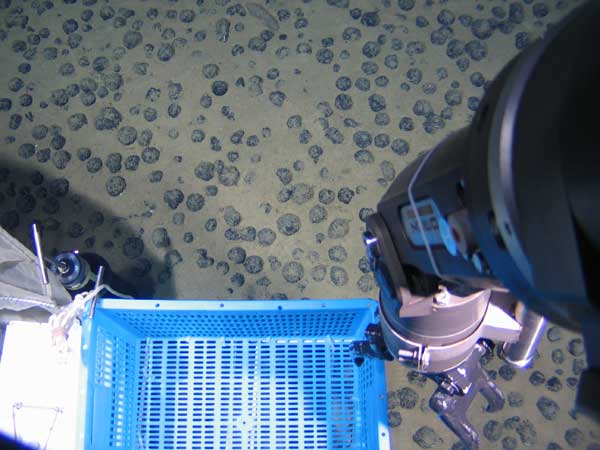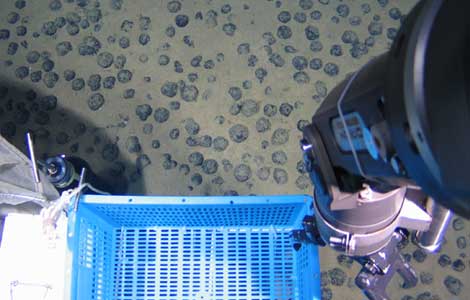Submersible taps mineral deposits in S China Sea
Updated: 2013-07-05 00:42
(China Daily)
|
||||||||
Jiaolong, the manned deep-sea submersible, is helping the country tap a treasure of iron-manganese deposits that were first discovered in the South China Sea on Wednesday.
Tang Jialing, an oceanaut on the submersible, told Xinhua News Agency that although the exact area of the deposits was still unknown, he was sure that it was large.
 |
|
A robotic arm of Jiaolong readies to take a sample of the iron-manganese deposits on Wednesday that the deep-sea manned submersible first discovered during its ongoing experimental voyage in the South China Sea. [Photo/Xinhua] |
Tongji University Professor Zhou Huaiyang, who was on board Jiaolong's support ship Xiangyanghong 09 on Wednesday, said scientists will conduct experiments to determine the age of the deposits.
"Since one of the samples was broken by the sub's robotic arm, a round core inside could be identified as volcanic lava. The materials covering the core are iron and manganese oxides, which need tens of thousands of years to form," he said.
Li Xinzheng, a biologist who was on board the Jiaolong, told Science and Technology Daily that besides the excitement he felt when the large-scale deposits were discovered, he was also struck by the size of the deep-sea world and its expansive population of strange species, most of which he had never seen before.
"I will never forget my experience in the deep sea," Li said.
Jiaolong will carry out two more dives in the area to continue research and survey the seabed. The large underwater mountain where the deposits were discovered was named the "Jiaolong Seamount" by scientists on board the submersible, Xinhua reported.
Zhou said he hopes more rock samples will be collected from the seamount during the coming two dives.
Jiaolong completed four deep-sea dives from June 17 to 20, collecting rare animal specimens and mineral samples.
Jin Jiancai, secretary-general of the China Ocean Mineral Resources Research and Development Association, said Xiangyanghong 09 is expected to sail for 113 days and complete three dive missions in its first experimental voyage, which began on June 10.
The first mission, set to last about 43 days, is in the South China Sea, where Jiaolong will test its performance and scientists will study the formation and development of the waters and record its influence on China's climate.
Jin added, the ship will then sail to two mining areas in the Pacific Ocean for a geological survey, collecting biological and mineral samples and preparing for future sea mining projects.
The mission marks the start of a five-year trial period for the Jiaolong before it starts regular operations, Xinhua reported.
Since 2001, China signed several contracts with the International Seabed Authority for mineral prospecting and exploration in the western Pacific Ocean and the Southwest India Ridge.
Jin told China Daily in a previous interview that the refined metals from the deposits will help the country meet the increasing demand for mineral resources during its rapid economic development.

 Muscle Beach Independence Day
Muscle Beach Independence Day
 Tough workout for Li Na in war of words
Tough workout for Li Na in war of words
 Submersible taps mineral deposits in S China Sea
Submersible taps mineral deposits in S China Sea
 Ecuador finds spy mic for Assange meeting
Ecuador finds spy mic for Assange meeting
 US martial artists arrive at Shaolin Temple
US martial artists arrive at Shaolin Temple
 July 4 in Prescott: Balance of grief, patriotism
July 4 in Prescott: Balance of grief, patriotism
 Jubilant crowds celebrate after Mursi overthrown
Jubilant crowds celebrate after Mursi overthrown
 Growth slowing for services
Growth slowing for services
Most Viewed
Editor's Picks

|

|

|

|

|

|
Today's Top News
Figures show shifts in US, China economies
Egypt's prosecution imposes travel ban on Morsi
Russia more impatient over Snowden's stay
Mandela still 'critical but stable'
Figures show shifts in US, China economies
Chinese electrician killed in Cambodia
EU and US set for free trade talks
China and Canada to form pact
US Weekly

|

|






